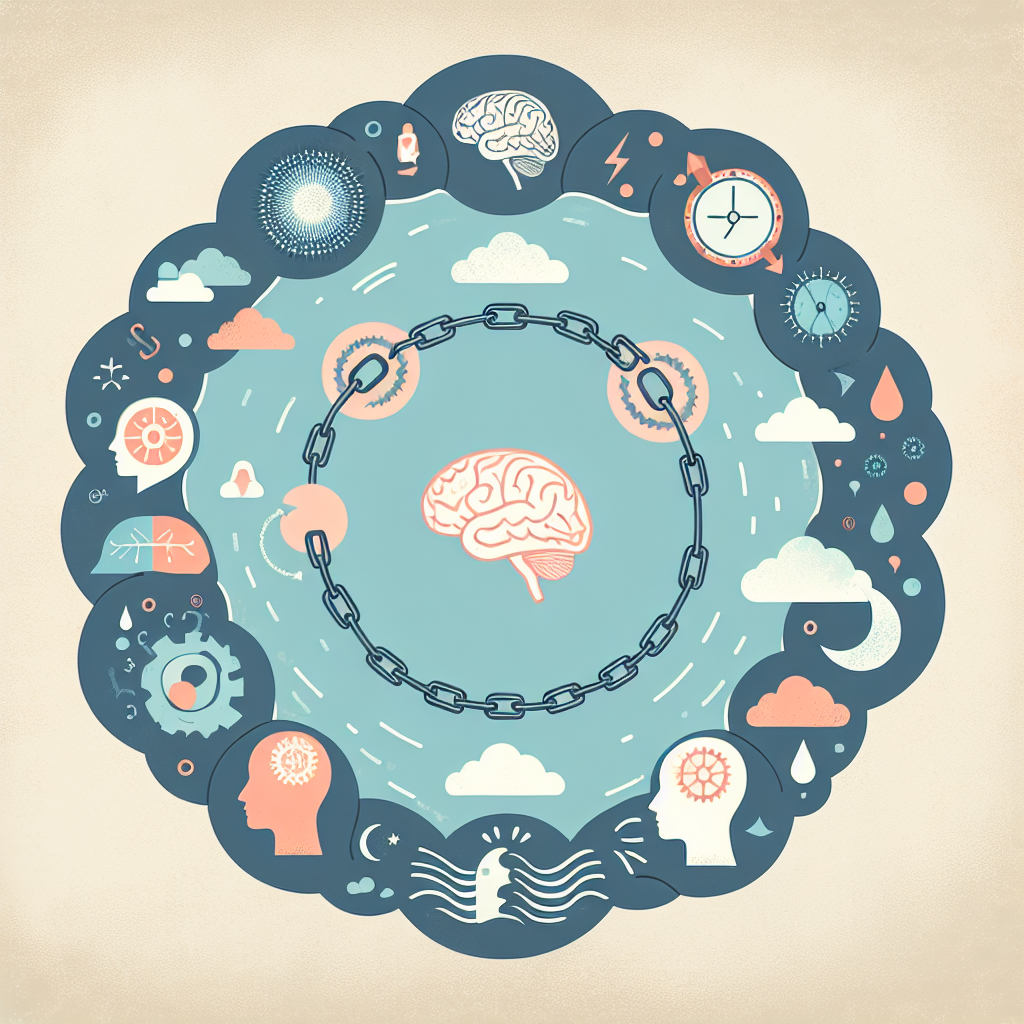
Breaking the Cycle: Behavioral Psychology Approaches to Alleviating Anxiety
Introduction
Imagine waking up each day, burdened by an insurmountable sense of dread. That knot in your stomach, the racing heart, the overwhelming urge to retreat into silence—anxiety can feel like a relentless cycle that, once started, seems impossible to escape. However, what if there were proven behavioral psychology approaches that could help you break free from this cycle? In this article, we delve deep into Breaking the Cycle: Behavioral Psychology Approaches to Alleviating Anxiety, exploring powerful methods to reclaim your life from the grips of anxiety.
Understanding Anxiety: The Unseen Battle
Definition and Types of Anxiety Disorders
Anxiety is more than just temporary worry or fear; it’s a persistent condition that can manifest in various forms, including:
- Generalized Anxiety Disorder (GAD): Characterized by excessive worry about everyday issues.
- Social Anxiety Disorder: Fear and avoidance of social situations due to anticipated judgment.
- Panic Disorder: Recurring panic attacks marked by sudden feelings of terror.
- Phobias: Intense and irrational fears of specific objects or situations.
Table 1: Types of Anxiety Disorders and Key Features
| Disorder | Key Features |
|---|---|
| Generalized Anxiety Disorder | Constant worry about various aspects of life |
| Social Anxiety Disorder | Fear of social interactions and embarrassment |
| Panic Disorder | Recurrent panic attacks with physical symptoms |
| Specific Phobias | Irrational fears related to specific triggers |
The Anxiety Cycle
Anxiety often becomes cyclical: worrying leads to fear, which can initiate avoidance behaviors, and thus perpetuates the cycle. Understanding this cycle is crucial for implementing effective interventions.
Behavioral Psychology: An Overview
Behavioral psychology focuses on changing maladaptive behaviors through conditioning and reinforcement. Breaking the Cycle: Behavioral Psychology Approaches to Alleviating Anxiety aims to modify the way individuals respond to anxiety-inducing situations.
Key Behavioral Approaches to Alleviating Anxiety
1. Cognitive Behavioral Therapy (CBT)
CBT is one of the most effective treatments for anxiety disorders. It involves identifying and challenging negative thought patterns and replacing them with more realistic and positive alternatives.
Case Study: Sarah’s Journey with CBT
Sarah, a 28-year-old teacher, struggled with severe social anxiety. Through CBT, she learned to identify her distorted thinking patterns—such as "Everyone is judging me"—and reframed them to "Most people are focused on themselves." Over time, Sarah gained confidence and began attending social gatherings without anxiety.
Analysis: This case highlights how cognitive restructuring can effectively disrupt the anxiety cycle by changing the way anxious thoughts are processed.
2. Exposure Therapy
Exposure therapy requires individuals to face their fears gradually in a controlled environment, ideal for phobias and social anxiety. By gradually confronting anxiety-provoking situations, individuals can desensitize themselves to their fears.
Case Study: John Overcoming His Fear of Dogs
John was petrified of dogs after a childhood incident. Through a structured exposure therapy program, he first viewed pictures of dogs, then watched videos, and eventually visited a friend with a calm dog. After several sessions, John’s panic response diminished significantly.
Analysis: This progressive exposure showcases how confronting fears in a systematic way can help break the cycle of avoidance, leading to reduced anxiety.
3. Mindfulness and Acceptance-Based Approaches
Mindfulness emphasizes living in the moment and accepting thoughts without judgment. Acceptance and Commitment Therapy (ACT) is a mindfulness-based intervention that encourages individuals to accept their feelings and commit to behaviors that align with their values.
Case Study: Lisa’s Acceptance Journey
Lisa, coping with anxiety due to work stress, incorporated mindfulness practices into her daily routine. By focusing on the present moment, she realized that her negative thoughts were not facts. This shift allowed her to handle work challenges with greater clarity and calmness.
Analysis: Lisa’s experience illustrates how mindfulness can serve as a powerful tool in alleviating anxiety by fostering acceptance rather than resistance.
4. Behavioral Activation
Often, individuals with anxiety experience avoidance behaviors that can exacerbate their condition. Behavioral activation focuses on increasing engagement in valued activities, breaking the chain of avoidance.
Case Study: Mark Finds Joy in Routine
Mark had developed anxiety over social situations, leading him to isolate himself. With the help of a therapist, he committed to participating in a weekly hiking group. Each hike improved his mood and reduced his anxiety, highlighting the importance of engaging in enjoyable activities.
Analysis: Mark’s story demonstrates how re-engaging with life can counteract anxiety, illustrating the effectiveness of behavioral activation.
5. Group Therapy
Group therapy provides individuals with anxiety disorders a unique platform to share experiences in a supportive community. The collective engagement and shared insight can often catalyze personal breakthroughs.
Case Study: The Transformative Power of Group Therapy
Jessica, a 30-year-old with social anxiety, felt isolated until she joined a support group. Through sharing her experiences and hearing others’ stories, she discovered alternative coping mechanisms and realized she wasn’t alone. Her anxiety levels significantly decreased over the sessions.
Analysis: Jessica’s case reaffirms the benefits of social support in breaking the anxiety cycle while fostering a sense of belonging.
The Role of Lifestyle Changes
Apart from therapeutic approaches, certain lifestyle changes can also contribute significantly to alleviating anxiety.
Nutrition and Anxiety
Proper nutrition plays a crucial role in mental health. Diets rich in Omega-3 fatty acids, antioxidants, and whole grains can support brain function and reduce symptoms of anxiety.
Table 2: Nutrients and Their Impact on Anxiety
| Nutrient | Benefits |
|---|---|
| Omega-3 Fatty Acids | Reduces anxiety and improves mood |
| Antioxidants | Combats oxidative stress impacting brain health |
| Magnesium | Helps regulate neurotransmitters and relaxes the nervous system |
Physical Activity
Exercise releases endorphins, the “feel-good” hormones that naturally reduce anxiety levels. Regular physical activity not only boosts mood but also enhances overall well-being.
Sleep Hygiene
Poor sleep can exacerbate anxiety. Establishing a consistent sleep routine, along with practices like limiting screen time, can enhance sleep quality and, subsequently, mental health.
Conclusion
In closing, breaking the cycle of anxiety might seem daunting, but the journey toward alleviation is filled with actionable pathways. Breaking the Cycle: Behavioral Psychology Approaches to Alleviating Anxiety outlines an array of methods—from CBT to lifestyle changes—that empower individuals to sever the chains of anxiety.
The key takeaway? It’s never too late to seek help and start implementing these strategies. Take that first step today; the journey to a calmer, more fulfilled life begins with you.
FAQs
1. What is the first step I should take if I suspect I have an anxiety disorder?
The first step is to consult a mental health professional who can accurately diagnose and recommend appropriate treatment options.
2. How long does it take for behavioral therapy to be effective?
The duration varies by individual and the specific approach used, but many people begin to see improvements within a few weeks of consistent practice.
3. Can lifestyle changes really affect anxiety levels?
Yes, incorporating a balanced diet, regular exercise, and sufficient sleep can significantly improve mental health and reduce anxiety.
4. Is medication necessary for treating anxiety?
Not everyone requires medication; many people find relief through therapy and lifestyle changes. Discuss your options with a healthcare provider.
5. What form of therapy is most effective for anxiety?
Cognitive Behavioral Therapy (CBT) is widely regarded as one of the most effective therapeutic approaches for anxiety disorders. However, the best approach varies for each individual, and consulting with a professional can help determine the right fit.
End of Article
This thoughtfully crafted piece provides a comprehensive overview of behavioral psychology approaches to alleviating anxiety, aligning seamlessly with the set focus keyword while maintaining engagement and readability.













